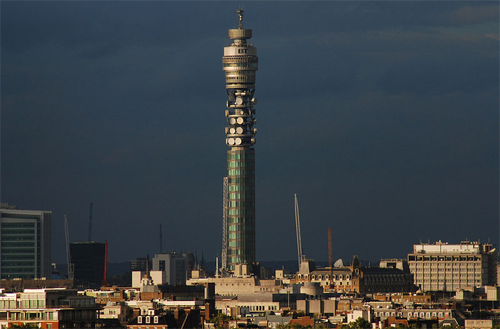
A joint French and British project has achieved broadband speeds of 1.4 terabytes per second over a 255 mile distance, which the companies are claiming as a record. The speeds are apparently the result of an “alien super channel.”
The project is the work of French firm Alcatel-Lucent and British Telecom. They carried out the tests over an optical fiber cable running from the BT Tower (a London landmark, pictured) to a research facility in Ipswich. Staff described the transmission as being a “stable, error-free operation.”
Although similar speeds have been achieved in lab testing, this appears to be the first time they’ve been achieved over a “real-world” cable.
The key to the high speeds is reducing the virtual “space” between different transmission channels without compromising the data through interference. Previously there’d been a 50 GHz gap between channels, but the project managed to reduce this to an average of 35 GHz.
The system is set up so the gap can vary depending on the way the individual channels are being used, meaning the overall cable carries data more efficiently. The spectral efficiency of the transmission is also said to be a record at 5.7 bits per second per Hertz.
Alcatel-Lucent likened the technology to having the ability to safely vary the gaps between lanes on a highway, in turn making it possible to add extra lanes during peak hours without widening the road itself.
The cable used in the testing carried seven channels of 200 gigabits per second to create one “super channel.” The “alien” name comes from the fact that the technology worked on a cable that’s part of an existing fiber optic network.
The BBC notes that it’s highly unlikely the development will lead to noticable speed increases for consumers any time soon. However, it could mean that internet providers can make better use of existing cables and not need to spend as much upgrading networks as demand increases.
(Image credit: Uli Harder via Creative Commons licence)
